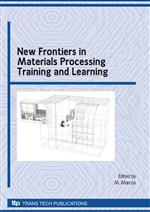Engineering Research
Materials Science
Engineering Series
New Frontiers in Materials Processing Training and Learning
Description:
Volume is indexed by Thomson Reuters CPCI-S (WoS).
Purchase this book:
Info:
Review from Ringgold Inc., ProtoView:
Papers from a September 2008 symposium, 14 in all, highlight recent work related to training and learning in materials processing engineering. They report on the latest developments, original applications, theoretical work, and case studies, with several of the papers addressing the new EHEA guidelines for the teaching of manufacturing engineering in university curricula. Specific topics include computer-aided teaching of the electro discharge machining process, teaching advanced processes in mechanical engineering project learning groups, a methodology for teaching the material removal processes by using CAD/CAM software, and the use of PDAs and smartphones in the classroom. The book includes b&w photos and screenshots. Marcos is affiliated with the University of Cadiz, Spain.

